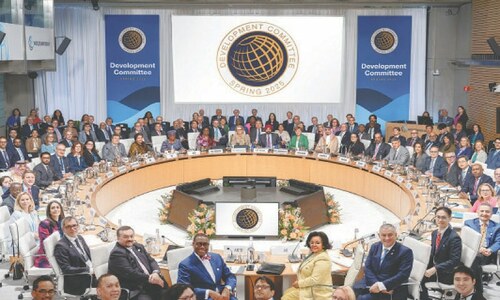ISLAMABAD: The government has developed a plan on how to accommodate patients in the event of a sudden outbreak of COVID-19, the disease caused by the novel coronavirus, in the country under which mild to moderate patients will be isolated in homes and critical patients will be admitted to hospitals.
The current outbreak was first reported in Wuhan, China, on Dec 31, 2019. There have been 104,025 reported cases so far in 98 countries, including 3,526 deaths and 58,527 recovered patients.
There have been six reported cases in Pakistan of which one patient has recovered and been allowed to join his family.
Special Assistant to the Prime Minister on National Health Services (NHS) Dr Zafar Mirza told Dawn that it was possible that the virus could die because of the rising temperature.
As only 20pc of patients become critically ill, they will be admitted to hospital, special assistant says
“However, as this is a new virus and this is the first outbreak in the world we cannot say for sure that the virus will be killed by the increase in temperature. So, at the same time, we are also making alternative arrangements to accommodate patients in the event of a sudden increase in cases,” he said.
Dr Mirza said the disease has a mortality rate of around 2pc which is why it has been decided that if there is a rise in cases, mild to moderate patients should be in houses - either their own or houses and buildings selected by the government for this purpose - which will be converted into isolation wards.
“As only 20pc of patients become critically ill, they will be admitted to hospital and provided proper care,” he added, explaining that patients who are more likely to develop serious symptoms because of their age, immunity level or pre-existing conditions would be considered critical.
Dr Mirza added that the recovery of one of the six patients in the country was good news.
The novel coronavirus is not similar to the polio or hepatitis viruses, microbiologist Dr Javed Usman said. These are non-enveloped viruses that become more active when temperatures rise as they remain in the water and resist detergent and organic material.
He described the coronavirus as a “delicate virus just like HIV”, saying: “According to an American professor, though HIV is considered very dangerous it is so delicate that it can even die from a dirty look. A large number of viruses belong to the coronavirus family and they die if the temperature increases.
“So it is hoped that the same will be the case with COVID-19 and it would not survive if current ambient temperature increases.”
“According to the recent literature, the virus may not survive if the temperature increases to 26°C. We had a sudden spell of rain in Pakistan or temperatures would have risen to 26°C by now,” he added.
When asked if Pakistan was prepared to deal with an outbreak, Dr Usman remarked that even developed countries do not have the capacity to accommodate a large number of patients in hospitals.
But, he added, fear and stress among the public should be reduced to boost immunity levels.
“When there was an outbreak of Sars [Severe Acute Respiratory Syndrome], a type of coronavirus, even the United States said it did not have ventilators to put every patient on. So in such cases, places are evacuated as a makeshift arrangement to keep patients,” he said.
“We need to understand that if a COVID-19 patient is in one room, all the people in the other room will be safe unless that patient goes to the other room,” he added.
Dr Usman suggested that the government should establish a dedicated unit with staff to deal with such issues, including dengue, which has also become a permanent issue in the country.
Published in Dawn, March 8th, 2020














































